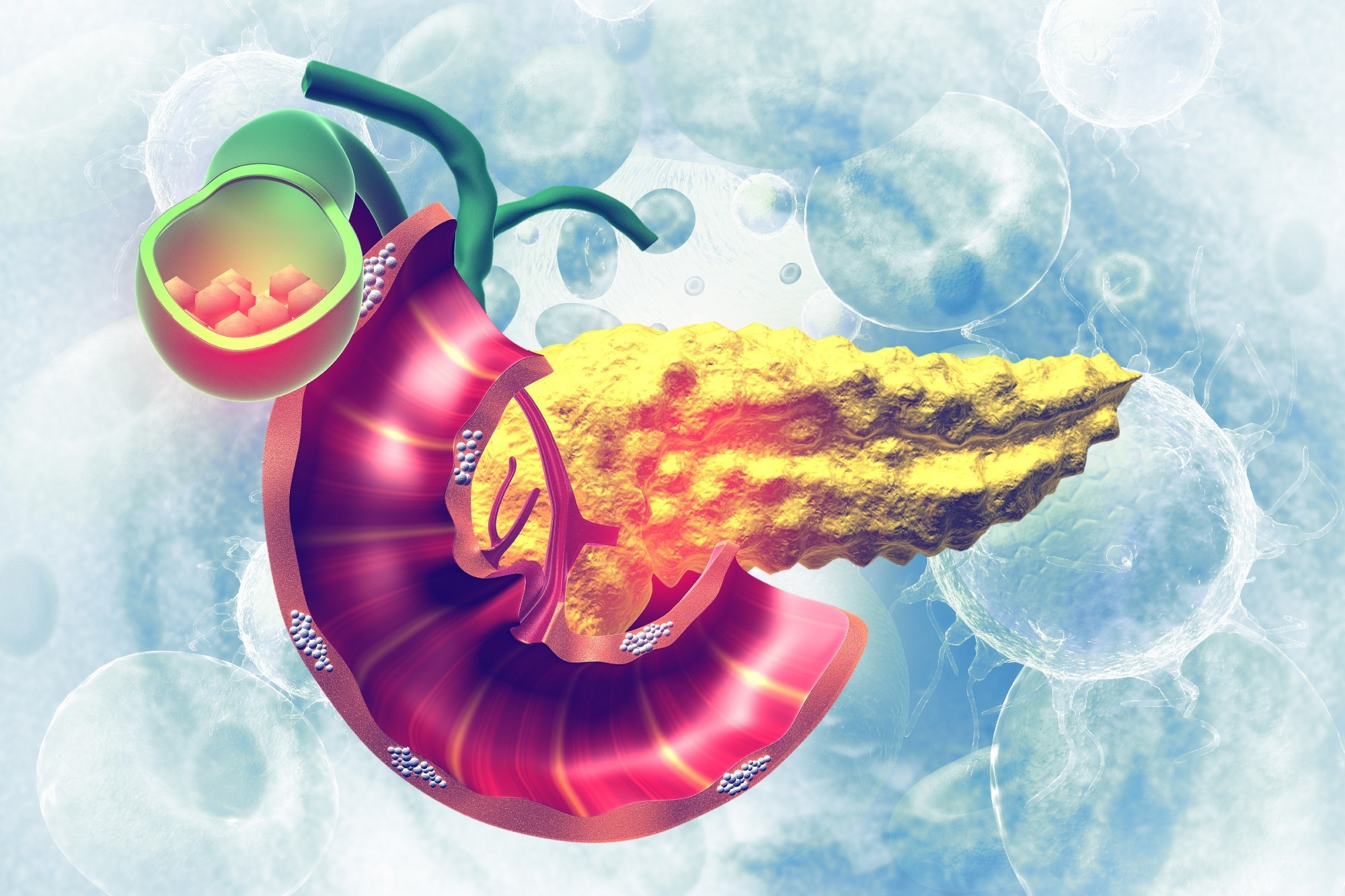In a recent study posted to Preprints with the Lancet, researchers examine the pathophysiology of the severe acute respiratory syndrome coronavirus 2 (SARS-CoV-2) infection in the pancreas and the role of the host factor placenta-associated 8 (PLAC8) protein in this pancreatic infection.
 Study: Host Factor PLAC8 is Required for Pancreas Infection by SARS-CoV-2. Image Credit: crystal light / Shutterstock.com
Study: Host Factor PLAC8 is Required for Pancreas Infection by SARS-CoV-2. Image Credit: crystal light / Shutterstock.com

 *Important notice: Preprints with The Lancet publishes preliminary scientific reports that are not peer-reviewed and, therefore, should not be regarded as conclusive, guide clinical practice/health-related behavior, or treated as established information.
*Important notice: Preprints with The Lancet publishes preliminary scientific reports that are not peer-reviewed and, therefore, should not be regarded as conclusive, guide clinical practice/health-related behavior, or treated as established information.
Background
The coronavirus disease 2019 (COVID-19), caused by infection with SARS-CoV-2, can affect various organ systems in addition to its primary target site of the respiratory system, with a significant number of COVID-19 patients experiencing gastrointestinal complications. Although the prevalence of pancreatic complications has not been observed at the same level as gastrointestinal complications, severe COVID-19 has been associated with pancreatic injury, inflammation, and dysfunction.
The highly conserved PLAC8 protein is expressed in the respiratory and gastrointestinal tracts, as well as the pancreas. PLAC8 is a known host factor in the infection of lung cancer cell lines with SARS-CoV-2, as well as the infection of swine intestinal epithelial cells with swine acute diarrhea syndrome coronavirus.
The pancreas is crucial for the production of digestive enzymes and essential hormones such as insulin. Therefore, it is imperative to understand the pathophysiology of SARS-CoV-2 infection in the pancreas and the role of PLAC8.
About the study
COVID-19 patients who were hospitalized between August 2020 and June 2021 were included in the current retrospective cohort study. Blood samples were obtained within two days of hospital admission from all study participants.
The COVID-19 diagnosis was confirmed based on positive real-time polymerase chain reaction (RT-PCR) results. Blood samples for the control group were obtained from blood and tissue banks for healthy COVID-19-negative individuals.
Tissue sections for immunohistochemical analysis were also obtained from one patient who succumbed to COVID-19. Pancreatic tissue samples for immunofluorescence analysis were retrieved from seven patients who had succumbed to COVID-19 and one aortic dissection mortality case.
For the pseudovirus experiments, plasmids encoding the spike protein of the ancestral Wuhan-1 SARS-CoV-2 strain, as well as SARS-CoV-2 BA.1 and BA.4/5 spike proteins, were used. Human embryonic kidney (HEK) 293T cells were used to produce lentiviruses to generate PLAC8 knock-out cells that were used to determine the role of PLAC8 in the infection of the pancreas by SARS-CoV-2. Western blot analysis was used to verify the PLAC8 knock-out.
Vero E6 African green monkey epithelial cells were used to grow SARS-CoV-2 Wuhan-1 and BA.1 strains that were isolated from patient nasopharyngeal swabs. Monolayers of SUIT-2 cells, which were obtained from human pancreatic carcinomas, were infected with the isolated and cultured SARS-CoV-2 variants. These cells were then subjected to flow cytometry and immunofluorescence microscopy to determine infection.
C-reactive protein, protease, lipase, and D-dimer concentrations were measured from the plasma samples of 80 COVID-19 patients. These samples were obtained from severe and critical COVID-19 cases, with 40 patients included in each group. A third group of 40 matched healthy controls was also included in the analysis.
Study findings
The postmortem analyses of patients who succumbed to COVID-19 revealed the presence of SARS-CoV-2 in the exo- and endocrine pancreatic tissue compartments. Evidence of cell damage was also observed, with morphological changes similar to those observed for SARS-CoV and SARS-CoV-2.
Previous cases of SARS-CoV infections have also revealed viral traces in the lungs, kidneys, liver, intestines, and pancreas, thus indicating that the pancreas was a potential target for coronavirus infection. The severity of COVID-19 was also associated with lipase levels, an indicator of pancreatic damage.
Pancreatic tissues obtained from patients who had succumbed to COVID-19 revealed significantly higher expression of PLAC8 as compared to tissue from uninfected individuals. These findings are similar to those from single-cell ribonucleic acid (RNA) sequencing of lung epithelial tissue, which revealed higher PLAC8 expression among COVID-19 patients. Likewise, knock-out experiments with PLAC8 demonstrated that the loss-of-function of PLAC8 suppressed the infection of pancreatic cells from all tested SARS-CoV-2 variants.
Conclusions
Overall, the findings revealed that the human pancreas is a potential target for SARS-CoV-2, with infections resulting in pancreatic injury. The levels of pancreatic enzymes in circulation are correlated with pancreatic injury and can be used to determine the prognosis for severe COVID-19 cases. Furthermore, the expression of the host factor PLAC8 is essential for the infection of the pancreas with SARS-CoV-2, revealing a new target to understand the pathogenesis of SARS-CoV-2 infection in the pancreas.

 *Important notice: Preprints with The Lancet publishes preliminary scientific reports that are not peer-reviewed and, therefore, should not be regarded as conclusive, guide clinical practice/health-related behavior, or treated as established information.
*Important notice: Preprints with The Lancet publishes preliminary scientific reports that are not peer-reviewed and, therefore, should not be regarded as conclusive, guide clinical practice/health-related behavior, or treated as established information.
Journal reference:
- Preliminary scientific report.
Ibarguen-Gonzalez, L., Heller, S., DeDiego, M. L., et al. (2023). Host Factor PLAC8 is Required for Pancreas Infection by SARS-CoV-2. Preprints with the Lancet. doi:10.2139/ssrn.4564662